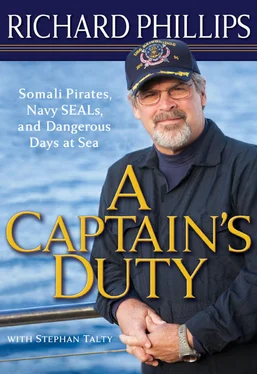When you get on a ship, you want to hit the deck running, but you can’t. There are ten thousand things to get ready when you’re setting sail, starting with the basics: What time do we eat? Are the cranes working? Are there any pipes leaking? Is the third mate sitting in his room saying “Redrum” over and over again? I’ve always said that all ships are different but working on a ship is always the same. You have to learn the vessel first, and you have to grab someone who’s getting ready to leave. Even though they’re dying to get off the ship and fly back to their family and kids or their girlfriend and a three-month supply of beer, you have to find out what’s been happening or you’re lost.
I met my crew. I’d worked with my chief mate, Shane Murphy, before. He was young, physical, and very hands-on. Shane was a straight shooter who looked like a Boy Scout and thought like a captain. We’d met in odd circumstances on our first trip together. He was going through the Oman airport heading to the ship when the customs officials decided to “temporarily confiscate” his CDs. It happens all the time, and the CDs often end up in the customs official’s own collection. Shane blew up and was arrested for “insulting a public official.” After three days in a roasting hot jail cell, we’d been able to get him out and onto our ship. He was a good shipmate and I knew I could count on him in an emergency.
Mike Perry was the chief engineer, a born-again Christian in his fifties who looked like a country-and-western singer and ran a tight engine room. I’d worked with him nearly three months before on the same EAF4 run. He was an ex-navy guy who was never afraid to argue with me if he thought he was right, which is something I’ve always respected, even encouraged, in a chief or any crew member. Things happen so fast on a ship that you have to know your duty automatically; when a typhoon’s threatening to rip your ship apart, or a pirate is closing at twenty-five knots, you either perform or you’re dead. So he and I were gung-ho about training. There was just one difference: Mike believed everyone could be trained to a high level, which is a navy thing. I believed some guys were just too far gone to absorb even the basics, and you had to work around that. You could only train some guys so much; perfection was just not possible.
I was relieved that Mike and Shane were sailing with me. They were both strong leaders, proactive about training the crew and getting jobs done right, qualities that are too often missing in sailors these days.
I met the rest of the crew. The third mate, Colin Wright, was a stout Southern guy I’d never met before. There was also an AB who was in his sixties and really should have been tending his gardenias in a retirement community. His best sailing days were behind him. You often had to explain the most basic things to him, and sometimes even then he wouldn’t get it. And I met a new AB who introduced himself as ATM. I demanded he get his passport and prove he wasn’t messing with me. Sure enough, there it was, “ATM Mohammed.” He was a Pakistani who’d won the lottery for an American visa. ATM was young, bright-eyed, and looked capable. The rest of the guys I shook hands with as the day went on. Onboard a ship getting ready to leave port, there’s no time for more than that. Most captains will make an initial assessment of the crew. This seemed like a good crew, with the exception of one of the senior sailors.
The command structure on a merchant marine ship is a lot like the military’s. The captain is responsible for the crew, the ship, and everything on it. Period. Below him are three divisions: the deck department, run by the chief mate (simply called the mate on a ship); the engine department, run by the chief engineer (known as the chief onboard); and the steward department, run by the chief steward. The mate is responsible for cargo, security, medical, maintenance, storing, loading, safety operations, and anything short of a meteorite landing on the forward deck. Under him is the second mate (called the paper mate), who is responsible for navigation, maintaining charts, and seeing to the bridge’s electronic equipment. He’s the voyage planner, the guy who lays the courses down, labels them, and makes sure the light list (which gives us all the lighthouses along our route) and the Notice to Mariners are up to date. The third mate is in the entry-level slot. He takes care of the safety equipment and does anything the mate tells him to do. Beneath the third is the bosun, the leader of the able-bodied seamen and the foreman who actually puts the mate’s orders into effect. The chief and his men (first, second, and third engineer) focus on what makes the ship go: the power plant and auxiliaries (compressors, pumps, and motors), as well as maintaining all the equipment on the ship.
Mark Twain said that going to sea is like going to jail with a chance of drowning, and he was spot on. You give up any idea of a normal, comfortable life when you step onboard. Merchant mariners aren’t weekend warriors; we are there to work twenty-four hours a day, seven days a week. On the water, every day is like a Monday—a workday with more to come stretching out into the distance.
I have a tough reputation in the business. I’m known to be demanding, and I am. Each sailor has the lives of his crew in his hands, and I wouldn’t allow them to be thrown away because someone wasn’t prepared. Andrea’s brother, who’s also a sailor, told her once: “Onboard Rich is a different person from the fun-loving guy you know. You wouldn’t even recognize him.” I do like to have fun whenever I can, but not at the cost of neglecting what the ship needs. That’s not going to happen on my vessel.
My first order of business was letting the crew know in no uncertain terms that we had to get the security profile right. The news out of Somalia was grim. Everyone knew that pirates there were wreaking havoc on the shipping lanes. The usual route around the Horn of Africa brings you within twenty miles of the Somali coast, but ever since 2005, when the pirates started terrorizing the merchant ships there, captains had been going out fifty miles, then one hundred, then two hundred miles to get away from these bandits. What was a five-day trip now takes ten. Ships don’t double their sailing time unless there are some very dangerous people waiting for them. But no matter how far offshore ships were going, the pirates were finding and hijacking them.
As soon as I settled aboard the Maersk Alabama, I started getting e-mail bulletins from the Office of Naval Intelligence and various security firms about pirates: mysterious blips appearing on radar and giving chase, gun battles, the works. Ships, fishing boats, and yachts were being taken left and right. A great deal of the action was taking place around the Somali coast and in the Gulf of Aden, a deep-water basin 920 miles long and 300 miles wide that lies between Yemen and Somalia on the Horn of Africa. Something like 10 percent of all the world’s petroleum supply is shipped via the Gulf of Aden, as tankers bring oil out of the ports of Saudi Arabia, through the Red Sea, into the Gulf, then out to the Arabian Sea and on to Europe and America. A trillion dollars’ worth of goods passes by the Somali coast every year. Essentially, sailors are bringing the world’s most vital resource through the world’s most unstable region, which had turned the area around the Gulf of Aden and the Somali coast into a shooting gallery. Anyone sailing there would be under constant threat of attack from pirates, who were getting smarter and more violent by the month. The total ransoms paid were soaring into the tens of millions a year, attracting desperate young men to the gulf like bees to honey.
And this was exactly where we were headed. Our next destination was Djibouti, which lies at the far western end of the Gulf of Aden. We had to sail in, unload, and get back out before the bad guys could get a bead on us.
Читать дальше












